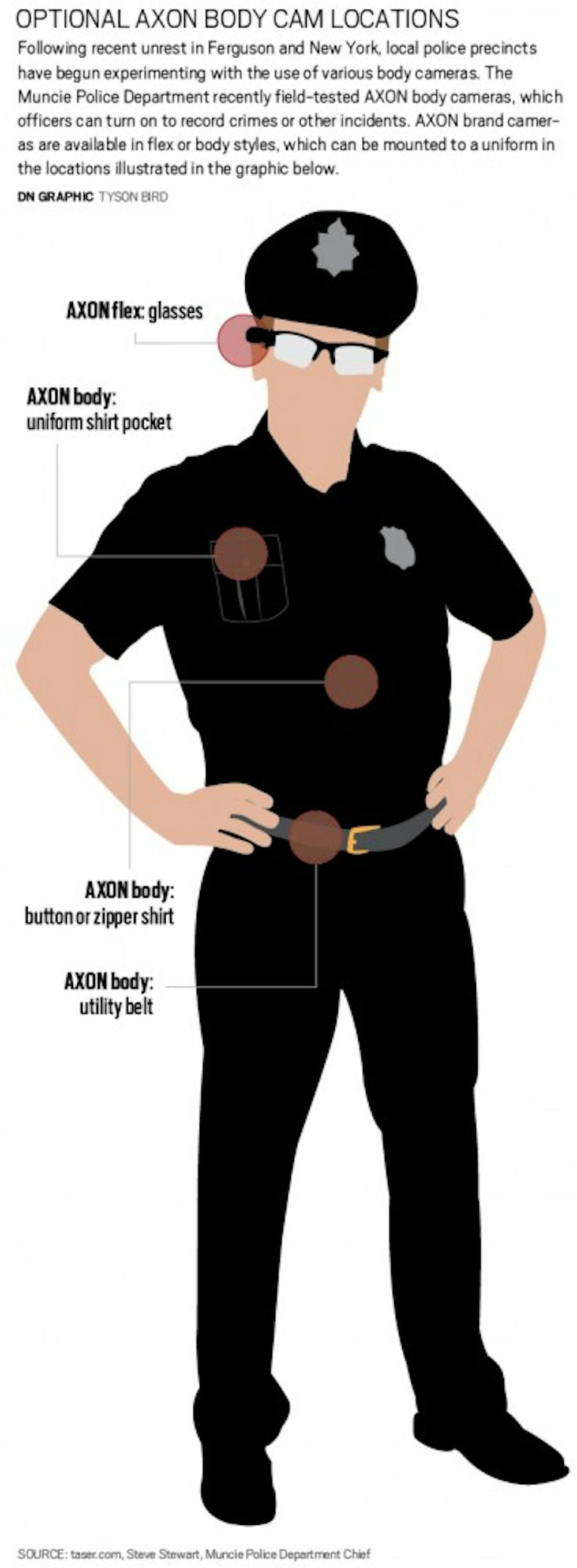Out of 254 police departments surveyed, more than 75 percent did not use body cameras as of July 2013. The study interviewed the 40 departments that had implemented body cameras and cited the following benefits:
- Operations more transparent to the public
- Help resolve questions that may come from police encounters
- Increase officer professionalism
- Help agencies evaluate and improve officer performance
- Allow agencies to identify and correct structural problems
- Fewer complaints
- Encounters between officers and public improved
Source: Implementing a Body Worn Camera Program, Community Oriented Policing Services of the U.S. Dept. of Justice
After the recent national concern with police accountability, the University Police Department is reviewing their practices and considering adding body cameras to their staff's equipment.
The move is a part of a new equipment analysis initiative, said UPD Chief James Duckham.
“We’re looking into a top-to-bottom analysis of what’s effective in policing today and what’s not and that’s part of our review,” he said. “Certainly we are evaluating [body cameras] but we haven’t made any firm decision either way.”
Duckham was hired as chief of UPD at the end of second semester, after spending first semester as interim police chief. He said because he has only been chief for about a month, the conversation about new equipment and body cameras is just beginning.
After unrest in Ferguson this summer and incidents in New York regarding tension between police officers and their communities, body cameras have emerged as a solution.
Locally, the Muncie and Daleville police departments have already adopted the cameras.
Muncie Police Department Chief Steve Stewart said his staff has received them positively so far.
“[Officers] love them. It’s their documentation of what happens on a call for service,” Stewart said.
A few months ago, MPD field-tested ASER International AXON body cameras after spending a year deciding whether or not to go forward with them. When the test was over, the cameras had to be returned but Stewart said they will buy them when the funds are available.
Stewart said in today’s landscape of technology, juries ask ‘Where’s the video?’ and so police officers want to wear the cameras.
“They are [already being] recorded by the general public,” Stewart said. “Obviously, video won’t lie.”
MPD is finalizing its policy to go along with the cameras.
Daleville added body cameras to its equipment in July, according to the Star Press. The Daleville Police Department was unavailable for comment.
At least one UPD officer, John Foster, recently wore his own personal body camera but a new UPD policy requires officers to only wear and use department-authorized clothing and gear.
Duckham said the new policy is best practiced in law enforcement and the department needs to be consistent in its equipment use.
Foster declined to be interviewed for the story.
Duckham said UPD’s analysis will look at other police agencies and studies by the federal government to evaluate the effectiveness of body cameras to help them decide.
If the department decides body cameras are a good idea, they will have to make decisions about what type of camera to use, and write policy for how the footage will be used.
“There’s a lot that goes into it. You’re [not just] putting a camera on an officer without doing some thorough evaluation of policy,” Duckham said.
He has never worn a body camera for law enforcement and he said it is too early to give his personal opinion on using body cameras for policing.
“I can’t make a statement about what would be good and what would be bad until I really get an in-depth analysis,” Duckham said. “I don’t want to just haphazardly do it.”





